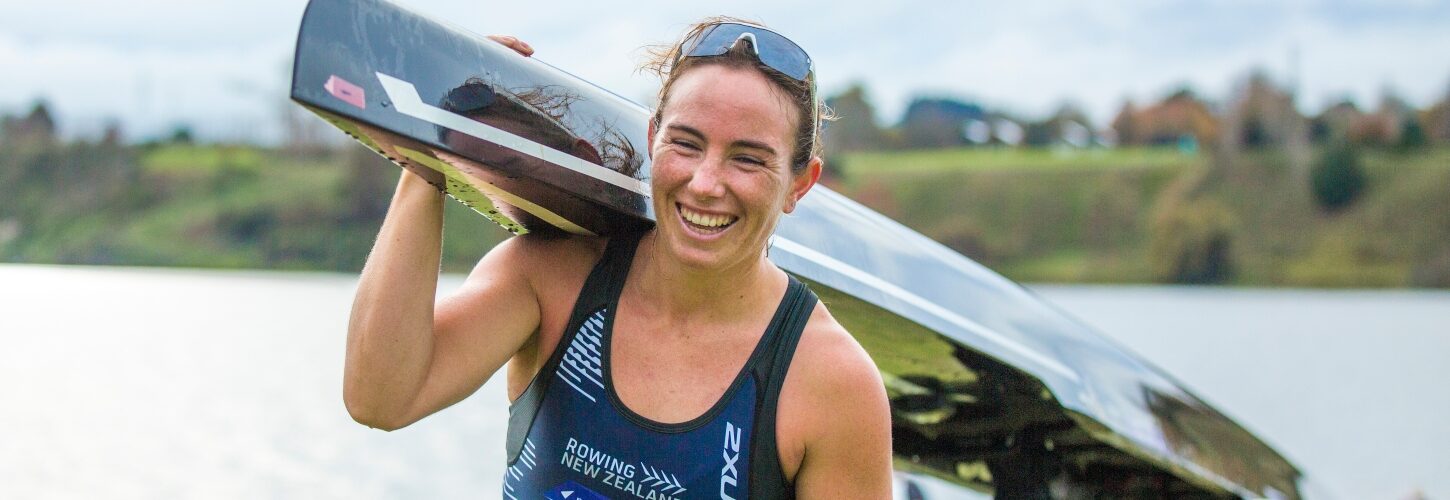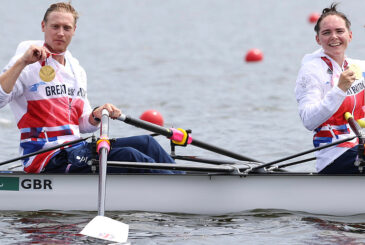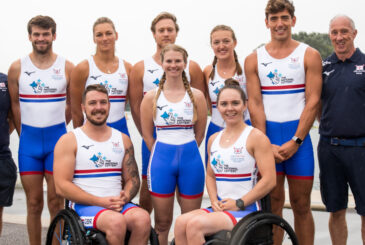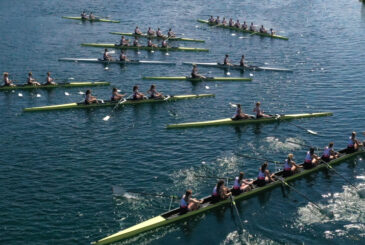New Zealand rower Olivia Loe has had to work harder than most to break into the senior team. But, since then, she has won two world titles in the women’s double with Brooke Donoghue. Martin Cross finds out more
If you got to know Liv – once a World Rowing Championships had finished – you’d find her a warm, friendly and outgoing person, who loves to socialise and likes nothing more than being surrounded by friends and family. She has a brother and her sister, Jess, also rowed for New Zealand.
They’re all qualities that the diminutive 28-year-old Kiwi says she gets from her Mum, Felicity. Those can be extremely helpful character traits in a team sport like rowing and Liv’s long-term double sculls partnership with 25-year-old Brooke Donoghue is testament to that.

The two women are friends both on and off the water and the relationship that they’ve forged – together with their coach James Coote – has taken them to world championship gold in 2017 and again, two years later, on the waters of the Danube in Linz.
Liv has made her lack of height – at 1.70cm, she is even 1cm shorter than Switzerland’s petite sculler Jeannine Gmelin – into a virtue
If you’re wondering what happened in 2018, well ‘failure’ of a sort. To be fair, most probably don’t count winning a world championship silver medal in Plovdiv behind Lithuania in 2018 as ‘failure’. But from Liv’s perspective, it was important to show that her first world championship gold in Sarasota was not just a one-off.
For that, she had to wait another year; a year of using the powerful motivation of missing out on gold to make sure it didn’t happen again.
Of course, by now you’ve guessed that there are many more qualities in Liv’s back pocket, some of which help her through those darker moments in both training and racing. They’re ones, which all top athletes would probably recognise as having to utilise at some time.
These are qualities that she admits may well have been passed on to her by her Dad, namely, her competitiveness, stubbornness and a ferocious work ethic.
They have all helped Liv to navigate what can only be described as a tricky path into New Zealand’s senior rowing team. And her Dad, having won 49 caps for the All Blacks as a ‘granite-like’ prop forward, can recognise just how much hard work it takes to finally pull on the coveted silver fern jersey. On the field, Richard Loe’s 1.86cm height and 100k physique allowed him to bring a fearsome physical presence to the game that could dominate his opponents. And his daughter does the same on the rowing course.
Liv has made her lack of height – at 1.70cm, she is even 1cm shorter than Switzerland’s petite sculler Jeannine Gmelin – into a virtue. There is nothing that this power-packed athlete can’t orchestrate from the stroke seat of her double scull, like the blistering third quarter that she and Donoghue threw in to secure her second world title. It’s determination and pace like that which has made the Kiwi double the favourites to take gold in Tokyo. And there’s no doubt that the woman from farming stock has just what it takes to handle the delay to the Games.
Martin Cross caught up with Liv just after the Kiwi team had returned from a well-earned break from training.
Martin: How long have you been back in training since lockdown and what did it feel like getting back?
Liv: We never stopped training when New Zealand went into lockdown or when the Olympics were cancelled. I spent eight weeks training at my flat in Cambridge where we spent more time on the erg that I thought was actually possible. When the weather allowed, we would cycle and we also had a makeshift weights room in our garage.
We did five weeks back on the water before our break and, minus the sore hands, I was surprised how normal getting back on the water felt and how little form I had lost after being off the water for so long.
How big a deal was it for you growing up in New Zealand with a dad who had played for the All Blacks?
It probably wasn’t until I went to high school that I became more aware of it. It definitely came up when I met new people. But I do question whether it was him being an All Black or the reputation he built whilst being one that was more the conversation point.
How would you describe your personality – similar or different to your sister?
I think Jess and I are pretty different as people, although we are both highly competitive. I tend to compartmentalise my emotions and separate what is, and isn’t relevant, to each situation. It helps me to focus on what’s important and switch off when needed. Jess is a vivacious and passionate person who lives in the moment.
Personality-wise, I’d say I’m more similar to my brother, Duke. We’re pretty close in age, but also share a similar perspective on life and the way we approach it. Although I’d say all three of us are very social and love being surrounded by friends and family.
What were you like at school?
I was definitely busy, and potentially a little naughty, but I had a lot of fun. I boarded at St Margaret’s and so did all my friends, so I loved my experience and came away with a lot of great friends.
“I vividly remember Lucy Spoors telling me if I couldn’t use my arms then my legs had better be bloody strong”
How was the experience of four years in the U23s?
U23s was definitely a roller coaster for me, but I learnt a lot over that time. My first year as an U23 was a huge learning curve and I really had to step up. I wasn’t ever a ‘first pick’ for crews, and in 2012 I wasn’t actually selected at trials but was brought into the team when another girl dropped out. I was constantly reminded through those early years about my height and my lack of potential relative to other people.
You had a really challenging year in the final U23 campaigns – can you tell us about it?
2014 was my final year in the U23 team and it was probably the most eventful. I was switched from sculling to sweep the first day of trials, which was a challenge in itself, and then managed to have a bike crash early into the season, breaking my shoulder.
I was told it would take 13 weeks to heal which wasn’t ideal as the World Rowing U23 Championships were in 11 weeks. I stubbornly continued to train, holding out hope that I would be the exception to the rule.
Our medical team relished the challenge of getting me back into the boat on time and my friends were full of encouragement. I vividly remember Lucy Spoors telling me if I couldn’t use my arms then my legs had better be bloody strong, and if I couldn’t do 10 pistol squats on each leg then I had no right to go to a World Championships.
A week before the team was departing to go to Varese for the World Rowing U23 Championships I was given an ultimatum that I had to be back in the boat and take part in the in-house regatta at Lake Karapiro, otherwise I would be replaced by the reserve.
“My main ‘take-home lesson’ was to always focus on the big things that you know make you fast, and trust those and the work you’ve done”
Being my final year of U23s I felt it was pivotal that I race, so seven weeks post-break with only two 4km rows under my belt and a large amount of strapping tape, I raced. One week later we flew to Italy and managed to pick up a silver medal in the women’s four.
What did you learn from being the spare on the senior team?
If you allow yourself, there is a lot to be gained from being a spare. However, being spare for two years running takes a little more willpower and can definitely test the motivation levels.
My most valuable time as a spare was in the build-up to Rio and around the Olympic Games itself. Witnessing the Olympic Games as part of the team, but without the pressure to perform, gave me the chance see how people coped and reacted under stress. This is something that I now try to be more self-aware of as I move through my own high-pressure situations.
My main ‘take-home lesson’ was to always focus on the big things that you know make you fast, and trust those and the work you’ve done.
What was it that allowed you to finally make the breakthrough into the New Zealand senior team in 2017?
Post-Rio there were a lot of retirements, so it largely came down to patience and perseverance.

The start of a new cycle is a good time to establish yourself as a contender for boats, so it was about putting myself in a position to win against girls that had historically been selected over me.
I also worked a lot with our sports psychologist to develop the tools that allowed me to ‘put myself in the race’ so to speak.
“Don’t use your size as an excuse for not being good enough”
What’s your favourite race and why?
I would have to say the 2019 World Rowing Championships final. In 2017 Brooke and I won, but there was always a voice telling me that it was a bit of a fluke. 2018 obviously didn’t go to plan, so when we managed to win in 2019, I finally let myself enjoy the moment.
Who are your key rivals for gold in Tokyo?
We’d never underestimate any country. The podium has looked different at every regatta so there is no front runner. The Olympics is a whole new ball game. Anything can happen.
What advice would you give to a woman of your size starting out in rowing?
Don’t use your size as an excuse for not being good enough. Even if those coaching, selecting or competing against you offer it as one. Find your strengths and make sure they outweigh the disadvantage that being shorter supposedly is.
Photos: Rowing NZ










